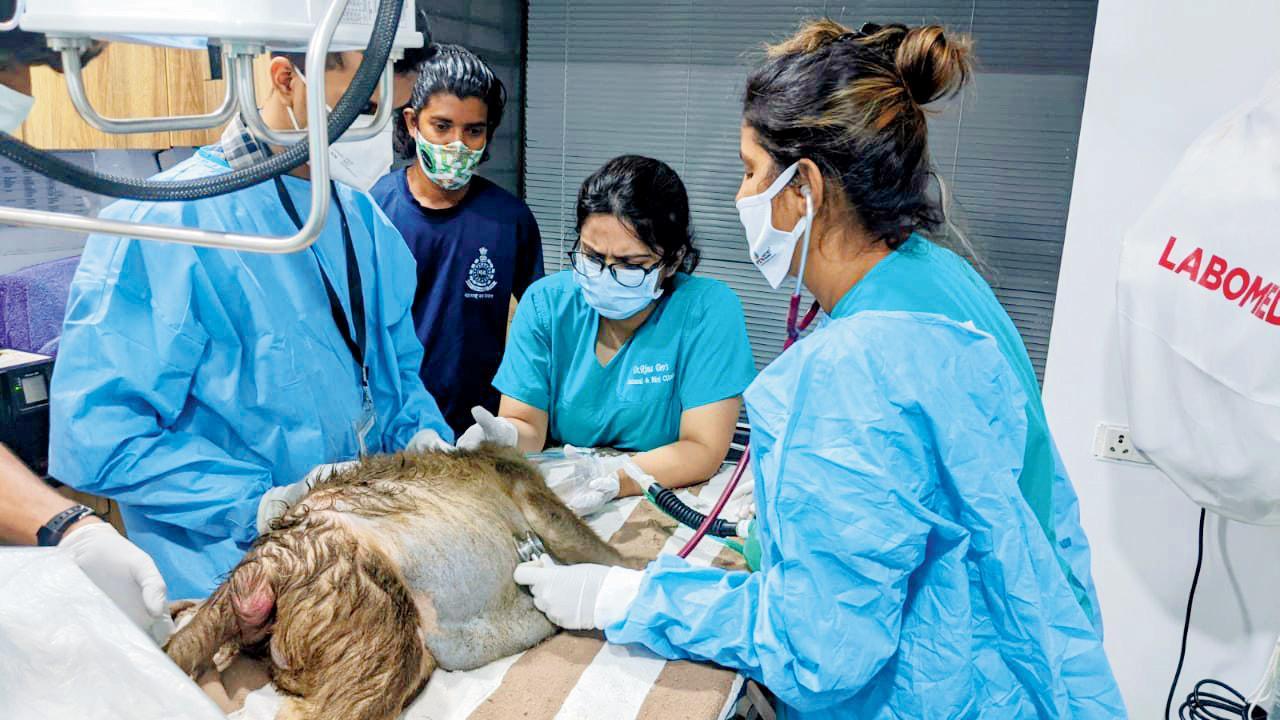Debilitating state of obese female macaque in Deonar is a cautionary tale for well-meaning citizens, say vets and wildlife experts

Dr Rina Dev attending a monkey. The doctor said it has a spinal fracture that has led to paralysis
Many kind-hearted people take to feeding stray monkeys, but a city-based NGO has found this has led to them getting obese. A monkey weighing 15 kg — nearly four times the average normal adult weight for a female of its kind — was recently rescued from Deonar. The find has once again led to experts stressing the need for humans to avoid feeding wild animals.
ADVERTISEMENT
The obese monkey that was recently handed over to NGO RAWW
Talking to mid-day, the President of NGO RAWW, Pawan Sharma said, “A few days ago we were handed the critical case of a rescued bonnet macaque by the Forest Department for further treatment. The primate was found limping due to a severe injury on its hind limbs by the locals near the Bhabha Atomic Research Centre (BARC).” The monkey underwent a detailed medical examination at veterinarian Dr Rina Dev's clinic.
‘Sought food from humans’
A female adult bonnet macaque on average weighs 3-5 kg while an adult male on average weighs 4-7 kg. “The female macaque weighed almost 15 kg at the time of the check-up and had a fractured spine leading to paralysis of the hind limbs The macaque was observed showing interest in an incorrect diet over its natural diet and was seen exhibiting actions of asking for food from humans around,” said Sharma.
Also read: Byculla Zoo to expand by 10 acres for new animals
As per the medical analysis, the injury suffered by the macaque is an old untreated one due to a fall. The RAWW team and the doctor feel that since the macaque could barely walk due to its paralysis and spinal trauma, it was very likely fed by the humans. “Subsidy feeding (feeding by humans directly or indirectly via irresponsible garbage management) is one of the major reasons for human-primate conflicts in the city. The repercussions are now proving to be more severe as we have started observing cases of macaques being diagnosed with human lifestyle diseases like obesity,” Sharma said.
Easy access to incorrect food
Experts also fear that just like in humans, there is a correlation between the poor/unhealthy diet the macaque consumes due to the easy access to junk food/incorrect or singular diet.
Dr Dev said, “The macaque was diagnosed with paralysis and there are high chances that this animal may not be able to go back into the wild. A detailed medical diagnosis and treatment cannot be immediately started due to the other complications involved. But we are closely monitoring its health. It has a spinal cord fracture which has led to paralysis.” The monkey has so far not been treated for obesity or the injury as it is under observation.
According to NGOs working in wildlife rescue, the population of monkeys at few locations on periphery of the Sanjay Gandhi National Park (SGNP) is increasing and there has not been any study nor have measures been taken to address the problem of human-monkey conflict. Sources from the forest department told this newspaper that monkey menace on the periphery of SGNP is a big issue and every other day they receive complaints about monkeys entering the housing societies and flats and stealing food. According to Sharma, in the past one year, 35 to 40 monkeys have been rescued by NGOs and the FD from the periphery of the park. “There needs to be a study undertaken to know the population of monkeys on the periphery of SGNP and how the issue of human-monkey conflict can be addressed. When people stop feeding them, these monkeys enter flats and sometimes even snatch food from people,” added Sharma.
‘Obesity just one issue’
Wildlife conservationist Kedar Gore said, “Although monkeys have enough food to choose from in the wild, they quickly adopt this easy way of life and become dependent on humans for food. Obesity is just one of the health issues they face. Several zoonotic diseases may be transferred from monkeys to humans and vice-versa in this process. Human-fed macaques and langurs have become rogue animals who attack humans, and snatch and steal food from them. This abnormal monkey behaviour is seen at hill stations like Khandala, Mahabaleshwar where feeding monkeys is a popular pastime for many. It is not only ethically wrong to feed wildlife species but also is an offence."
Dr Varad Giri from Bombay Natural History Society (BNHS) said, “The availability of junk food, that too without any effort, alters the natural behaviour which affects the physical appearance as well. If this is true for humans, then it is for other species as well. Free food makes them lazy affecting their physical fitness.”
Assistant Commissioner, Wildlife, Dr Shailesh Pethe said, “Feeding of wild animals is not only a violation of the Wildlife Protection Act, but also technically inappropriate. It causes unnecessary habitation which can be detrimental to both human and wildlife.”
3-5 kg
Weight of an average adult female bonnet macaque
4-7 kg
Weight of an average adult male bonnet macaque
 Subscribe today by clicking the link and stay updated with the latest news!" Click here!
Subscribe today by clicking the link and stay updated with the latest news!" Click here!






